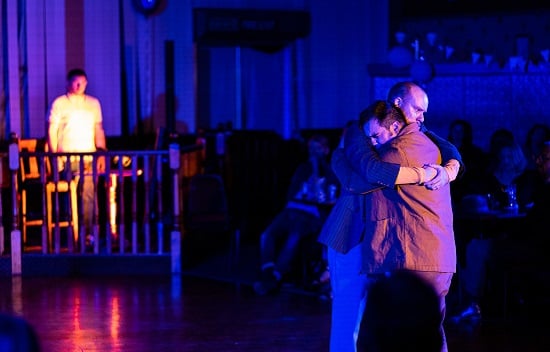
A performance of MAN UP at the Goldenhill Working Men's Club, Stoke-on-Trent
Photo: Jenny Harper
‘I want to take the emotional risk’: getting men to open up about mental health
Restoke anticipated difficulties getting local men to talk about their mental wellbeing – then 170 of them responded to its first casting call. Clare Reynolds explains how co-creation helped create lasting change
Restoke, based in Stoke-on-Trent, began as three local artists drawn together through a shared interest in performance, public places, and people’s stories. Over the last 10 years we’ve created participatory shows that look at social issues and open up dialogues with people from all walks of life.
But like a lot of participatory arts groups, we found that females’ participation outstripped males’ – in our case by a margin of precisely two-to-one. So, in 2017 we set ourselves the task of creating an all-male show about masculinity and mental health – MAN UP. We were interested in challenging our methods of co-creation and looking at how performance could contribute to the growing conversations around men’s mental health.
People and venue
We expected there would be challenges in attracting men to take part in a project that involved singing, dancing and opening up about their mental health so we were bowled over when we received more than 170 emails in response to our first call out. These men sent us their stories, support, and tentative interest in getting involved. Sixty-three of them joined us at meetings, conversations and taster workshops in dance, singing, poetry and illustration and by Spring 2018, 16 of them had self-selected to join professional performers and become the 21 “Up Men” who created and performed in MAN UP.
Our work is always site-specific, and we deliberated over the right venue to make this show. When we walked into Goldenhill Working Men’s Club on the outskirts of Stoke-on-Trent, Mick, the Steward, showed us to the concert room, complete with stage, dance floor, seating for 200, and even a Wurlizter organ. It proved the perfect venue, offering exciting staging possibilities but also a reminder of the working-class culture so important to our city. Working Men’s Clubs are sometimes the last bastions of a masculine culture which has been in rapid decline.
The experience of masculinity
Creating the show in an active and busy community venue was a challenge, as was doing justice to a subject matter that kept expanding with every conversation we had. We created a mission statement to keep ourselves on track: one of the points was to “seek out collective experiences but also individual stories which may challenge stereotypes and stigma around masculinity and mental health.” Along the way we lost some participants who felt their experiences were not reflected in the work as it developed. We learnt a lot about co-creation and how we balance an inclusive and democratic process with the artistic decisions we make in producing a performance, and are always looking for ways to learn, refine and offer transparency in the way we do this.
In August 2018, these 21 men took to the dance floor of the Working Men’s Club for four sell-out shows. Stories about work, race, class, sexuality and gender transition were supported by northern soul dancing, projection, disco and song. In the words of one audience member, the performances were “full of fury and fragility, challenging expectations and building resilience. An urgent reminder of the breadth of experience of masculinity”.
Creating a legacy
Throughout the project, we worked with artist and researcher Nicola Winstanley, who created an evaluation report and worked with the Up Men to give audiences an insight into their creative process. The exhibition was installed in the Working Men’s Club toilets and phone booth. We hope that other organisations can read Nicola’s report and learn from our experiences, challenges and moments of magic.
At the beginning of 2019 we were successful in attaining funding for a legacy programme – Up Men. Steered by some of the MAN UP creators, the Up Men programme aims to involve more men in Stoke-on-Trent in creative activities ranging from a regular singing group to one-off activities with guest artists over the next two years, with a focus on encouraging positive mental health. It felt vital that the show was not the end of this journey and we’re so pleased to be able to keep these conversations going. Ultimately, the Up Men felt that stepping out of their comfort zone and committing to a creative process propelled by self-expression was a profound experience and they want to encourage more men to do the same.
Adrian, one of our Up Men, said this about the process: “On returning home I found myself thinking that I don’t really want to go back to the person I was before this whole emotional exposure happened… I want to carry on wanting the friendships, wanting the conversations and wanting all the hugs. I want to take the emotional risk.”
Clare Reynolds is the Co-Artistic Director of Restoke.
Join the Discussion
You must be logged in to post a comment.